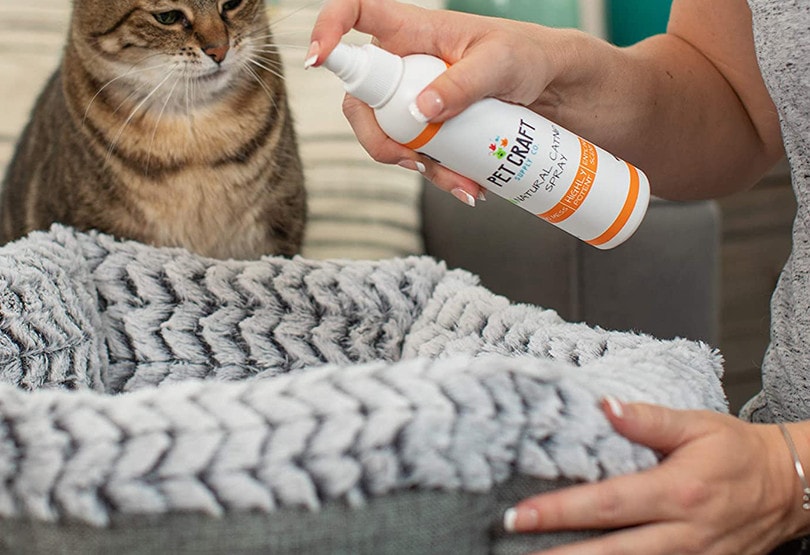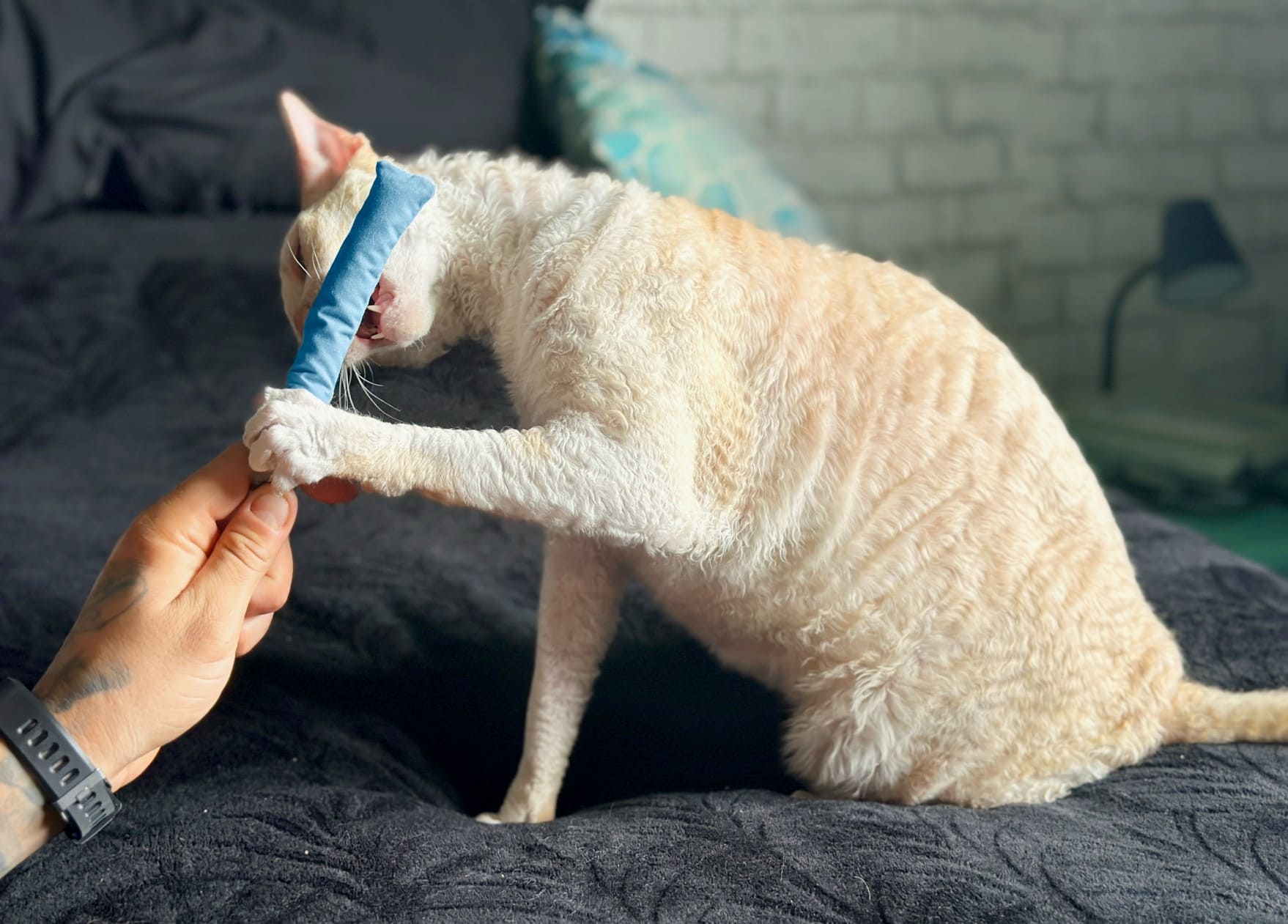Click to Skip Ahead
Cleaning up after your cat is easy when waste is deposited in the litter box, but what do you do when your cat urinates on concrete? Although concrete is a durable substance, it absorbs liquid when not treated with a concrete sealer. Uric acid crystals can become trapped under the surface of the urine, and when the surface becomes wet, the potent smell can return.
You can hire a contractor to clean the concrete, but you have several DIY options to remove the stain and save you a few dollars. We’ll discuss how to treat fresh stains and dried stains.

Before You Begin
Since some concrete cleaning methods take several days to complete and use strong chemicals, it is best to keep your family and pets away from the area until you’re finished.
- Vinegar
- Hydrogen peroxide
- Trisodium phosphate (TSP)
- Enzymatic cleaner
- Positive ion cleaner
- Dish soap
- Water hose
- Paper towels
- Scrub brush
- Eye goggles
- Disposable gloves
- Long-sleeve shirt and pants
- String or chalk
- Wet/dry vacuum
- Ultraviolet lamp
Before beginning the cleaning project, be sure to wear gloves, goggles, and a long-sleeved shirt to prevent any splashes from harming your skin. Vinegar and hydrogen peroxide are less potent than TSP or enzymatic cleaners, but they can irritate your hands while scrubbing concrete. If the concrete is not in a well-ventilated area, we suggest using a respirator when working with TSP or enzymatic products.
If you're trying to find an enzyme cleaner that does it all, we highly recommend our favorite cleaner, the Hepper Advanced Bio-Enzyme Pet Stain & Odor Eliminator Spray.
| Rating | Image | Product | Details | |
|---|---|---|---|---|
 |
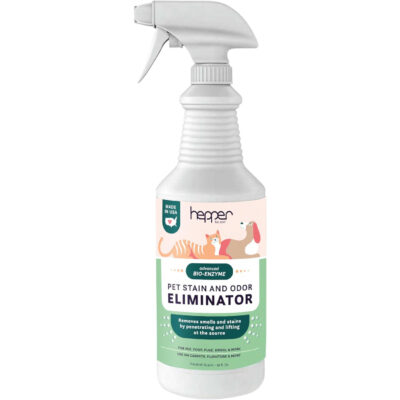 |
Hepper Advanced Bio-Enzyme Pet Stain & Odor Eliminator Spray |
|
CHECK PRICE |
It permanently removes the very worst stains and smells you can imagine and makes clean up a breeze. There's even a 100% satisfaction guarantee! Click here to order a bottle today.
At PangoVet, we’ve admired Hepper for many years, and decided to take a controlling ownership interest so that we could benefit from the outstanding products of this cool cat company!

Fresh Stain Removal
A large, yellow puddle on your garage floor is the last thing you want to see before leaving for work, but luckily, fresh stains are much simpler to treat than dried ones.
1. Hydrogen Peroxide
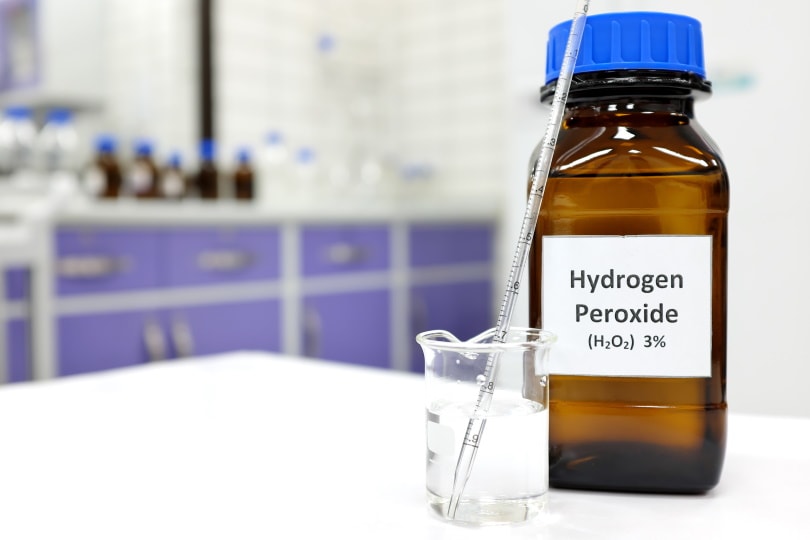
| Cost: | Low |
| Estimated completion time: | 1 to 4 days |
| Difficulty: | Low |
Hydrogen peroxide is a handy chemical to have in your household supplies. It disinfects wounds, treats bad breath, creates science fair volcanoes, and removes urine from concrete. It’s the cheapest solution on our list, but it takes longer to react than other chemicals and typically requires multiple applications. Before using hydrogen peroxide on the stain, soak up the urine with paper towels and use a hose to rinse off the area.
Next, mix 2 cups of hydrogen peroxide with 1 teaspoon of dish soap and 2 teaspoons of baking soda. Cover the stain with the solution and allow 24 hours to dry. You can sweep the spot clean if you do not detect lingering odors, but you may have to repeat the treatment for several days until the smell dissipates.
2. Vinegar
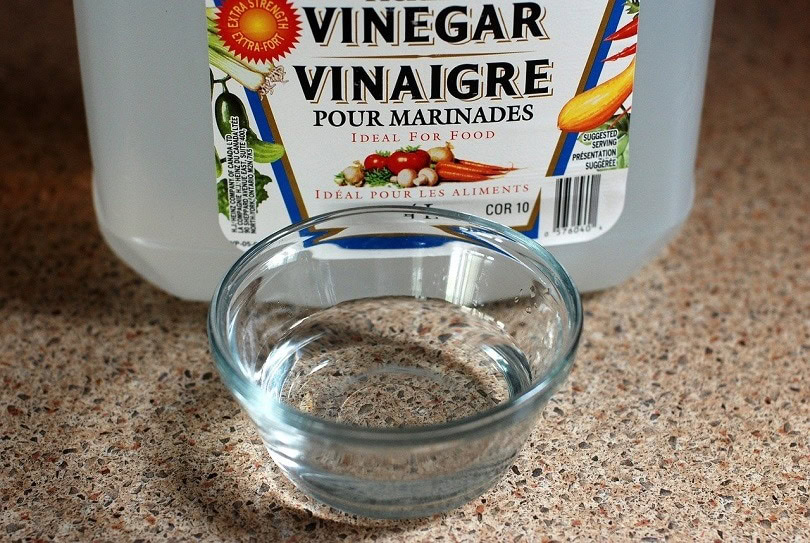
| Cost: | Low |
| Estimated completion time: | 24 hours |
| Difficulty: | Low |
When you’re shopping for supplies, you may notice that vinegar comes in several types and colors. While food-grade vinegar can treat urine, white vinegar designed for cleaning is more powerful and effective on stains. Like the previous technique, use paper towels to absorb the pooled urine and spray off the area with the water hose. Next, mix 2 cups of vinegar and 1 cup of hot water and saturate the stain with the solution.
Scrub the stain with a brush or deck brush for large spots and rinse it with a bucket of hot water. Dry off the excess water with a wet vac and wait 24 hours for the area to dry. If an odor remains, repeat the process.
3. Trisodium Phosphate
| Cost: | High |
| Estimated completion time: | 24 hours |
| Difficulty: | Low |
Trisodium phosphate (TSP) costs more than vinegar or peroxide, but it works fast and usually requires fewer applications than household cleaners. However, it’s a heavy chemical that produces toxic fumes and requires adequate ventilation if treating a garage or basement floor.
After soaking the urine with paper towels and rinsing it with a hose, mix 1 gallon of hot water with ½ cup of TSP and pour over the stain. Thoroughly scrub the stain with a brush and allow it to dry for 5 minutes. When TSP reacts with uric acid, the urine smell will get stronger initially but quickly decrease until no odor remains. Rinse the spot with hot water and dry with a wet vac. Repeat the rinse and dry steps twice more, and then allow 24 hours for the area to dry.
4. Enzymatic Cleaner
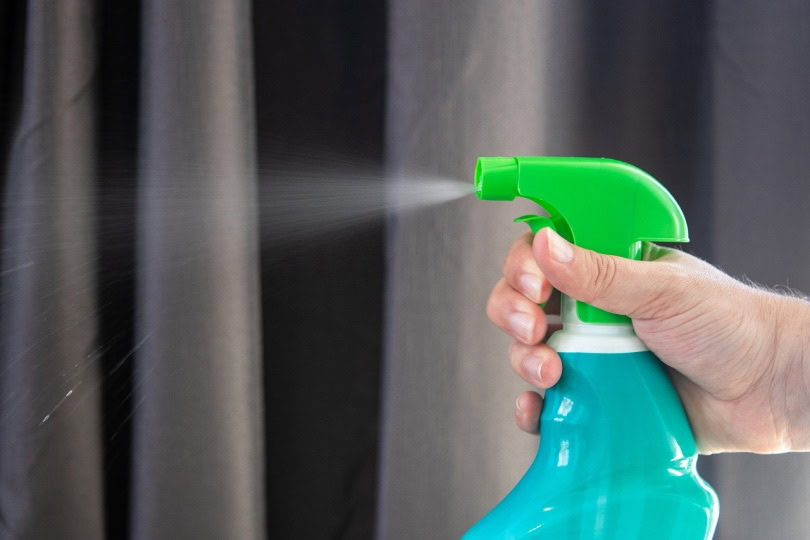
| Cost: | Moderate |
| Estimated completion time: | 24 hours |
| Difficulty: | Low |
Compared to household chemicals, enzymatic products cost more, but they’re more successful at eliminating odors than the previous methods. Depending on the stain’s size, you may want to purchase a small bottle of cleaner rather than the 1-gallon size. Enzymatic liquids have a limited shelf life and lose potency after sitting for 6 months.
First, mop the liquid with paper towels and rinse with a water hose. Add the cleaner and scrub with a brush for 10 minutes. Then, cover the area with a tarp. The tarp will prevent the cleaner from drying too quickly; enzymatic chemicals are more efficient when they’re allowed to dry slowly.
Wait 24 hours for the site to dry and check the area for odors and discoloration. You do not have to rinse the spot with water, and you probably will not have to repeat the steps to remove the smell and stain.

Dried Stain Removal
Although most dry stains are visible to the naked eye, you can check the concrete with ultraviolet light to avoid missing any spots. Mark the locations with a piece of chalk or rope and scrape any dried residue with a dull knife. Sweep the area clean and use one of the previous methods for treating wet stains as a pre-treatment.
1. Enzymatic Cleaner
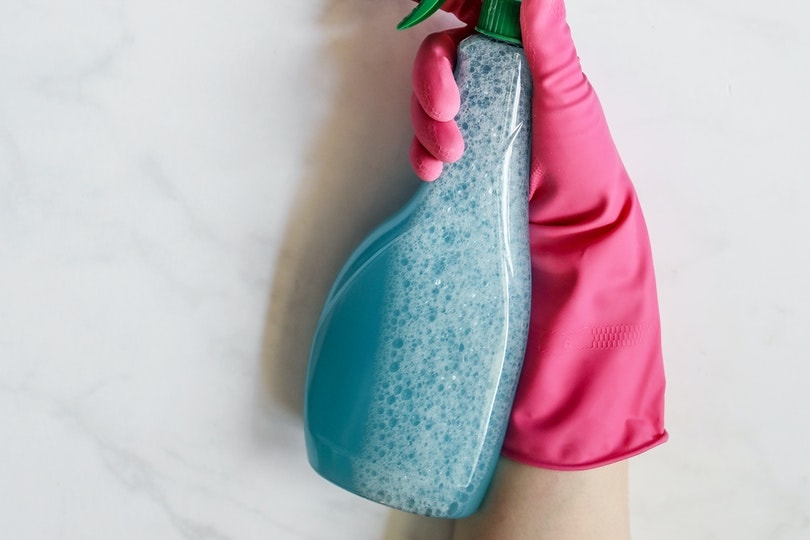
| Cost: | Moderate |
| Estimated completion time: | Pre-treatment time + 24 hours |
| Difficulty: | Low |
Enzymatic cleaners contain compounds that attack the proteins in urine and eliminate strong odors. Some cleaners must be diluted with water, but the products in spray bottles can be applied directly to the stain. Mix the enzymatic solution according to the manufacturer’s instructions and pour it over the stain. Use a scrub brush on the spot for 10 minutes to distribute the cleaner and cover it with a tarp to minimize drying. After 24 hours, check the area for odors and repeat the process if staining or smells remain.
- ADVANCED ENZYMATIC CLEANER - Penetrates the most stubborn smells and stains at the deepest molecular...
- FOR ANY MESS, ON ANY SURFACE - This pet odor eliminator cleans your carpets, floors, furniture,...
- FRESH, NATURAL ODOR - Our unique formulation doesn't rely on dangerous or unpleasant chemical...
2. Positive Ion Cleaner
| Cost: | High |
| Estimated completion time: | Pre-treatment + 12 hours |
Positive ion cleaners are more costly than other products, but they have longer shelf lives than enzymatic cleaners. Unlike the other products, positive ion kits contain three products that you apply in steps. After removing any dried solids, pour the first cleaner on the stain and allow it to sit for 8 hours. Next, sprinkle the Step 2 powder on the spot and allow it to work for 4 hours.
Sweep up the dried remnants and add the last powder to the stain. After 4 to 6 minutes, you can vacuum the powder and check the spot for lingering odors. You can also turn out the lights and check the area with a blacklight to ensure the positive ion products eliminate every trace of uric acid. Most positive ion treatments do not require multiple applications to remove the smell and stain.

Using a Concrete Sealer
Even with premium cleaners, removing cat urine stains can take several hours or days. You can avoid a lengthy clean-up job by applying a durable concrete sealer to your basement or garage.
Acrylic Sealer
Acrylic sealants are one of the most affordable options for protecting concrete, but they’re better suited for outdoor areas like walkways and driveways. For DIY enthusiasts, acrylic is easier to use than other products. They’re UV resistant but not very durable and must be reapplied every 3 years. If you’re sealing a garage floor or basement, we suggest using an epoxy or polyurethane sealer.

Epoxy Sealer
Although an epoxy sealant will fade from exposure to sunlight, it forms a solid layer of protection on the surface that repels liquids and heavy impacts. Epoxy kits come with two chemicals that must be mixed and immediately applied before the material hardens. You can buy low-odor epoxy products, but some brands are incredibly volatile and require adequate ventilation and safety gear. Epoxies are trickier to work with than acrylics, and you may want to hire a contractor if you need an epoxy coating.
Polyurethane Sealer
Polyurethane coatings are not as thick as epoxies, but they’re twice as thick as acrylics. Unlike epoxy, polyurethane does not fade from sunlight or require mixing two chemicals. It provides superior moisture and impact protection, but it typically costs more than acrylic or epoxy coatings.

Conclusion
The proteins in cat urine can create quite a stench when they become trapped in concrete. Removing the smell and stains with household products or commercial odor removers can return the surface to its prior condition. Vinegar and hydrogen peroxide methods are the most affordable, but they do not guarantee that your cat will not return to the same area.
With an enzymatic cleaner, trisodium phosphate, or positive ion treatment, you can eradicate the cat’s scent. Although installing a concrete coating is expensive, it can protect the floor from cat urine and keep you from using lengthy clean-up techniques.
Featured Image Credit: nanniezwawa, Shutterstock







